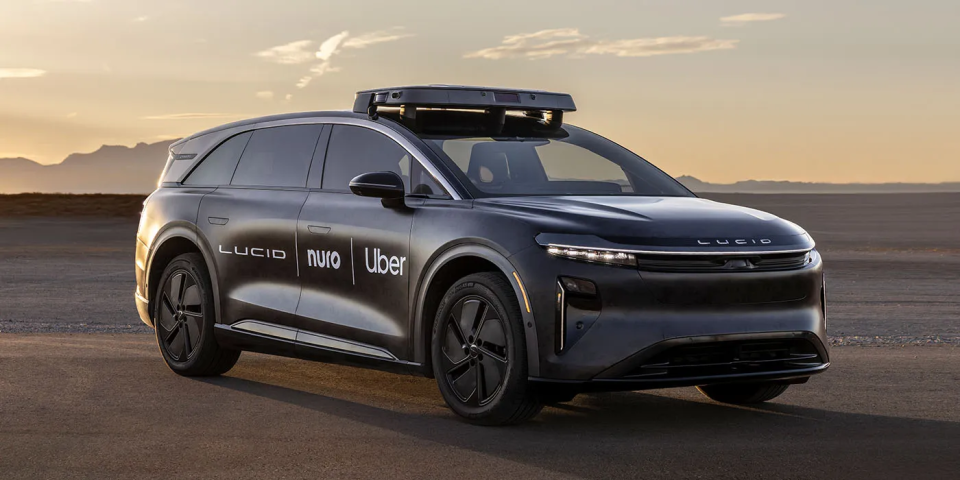Uber Technologies (NYSE: UBER) is taking another big step into the autonomous vehicle race, announcing on Thursday that it will invest $300 million in Lucid Group (NASDAQ: LCID) as part of an agreement to deploy more than 20,000 robotaxis on its platform in the next six years. Lucid’s electric vehicles, powered by self-driving technology developed by Nuro, will make up Uber’s latest fleet in what the company describes as its largest robotaxi commitment to date.
This deal will see Lucid’s new Gravity SUVs, built specifically for this partnership, equipped with Nuro’s Level 4 autonomous driving system. Level 4 means these vehicles are designed to operate without any human intervention in most conditions. It is a significant departure from earlier testing phases seen across the industry that have often required a safety driver. Uber, Lucid, and Nuro say they expect these robotaxis to hit the road in a yet-to-be-named major U.S. city next year, after which the rollout is expected to expand across other cities.
What sets this robotaxi initiative apart from past attempts is the confluence of each player’s expertise. Lucid, best known for its efficiency-focused luxury electric vehicles, provides an EV platform with long range and spacious interiors. Gravity, Lucid’s larger SUV model, offers roomier rides that cater to the varied needs of urban travelers and ride-sharers. Nuro brings its experience from years of driverless delivery pilots. While Nuro’s past efforts have focused on moving goods, the company’s “Nuro Driver” technology now adapts to transporting people, marking its first major foray into passenger vehicles with a technology licensing partnership. Uber supplies the ride-hailing muscle, its vast marketplace will ensure these robotaxis are met with plenty of demand when they go live.
For Lucid, the $300 million cash infusion is more than just an investment. It comes as a much-needed vote of confidence during what has been a competitive and challenging season for electric vehicle manufacturers. In addition to the capital, Lucid gets a guaranteed buyer for at least 20,000 vehicles, along with a prominent feature in Uber’s global urban mobility vision. Lucid’s interim CEO Marc Winterhoff described the partnership as opening a completely new market, supporting the brand’s ambitions to reach far more drivers and passengers than it could through retail sales alone.
Nuro, meanwhile, sees this as a validation of almost a decade spent building AI-first autonomy systems. Nuro’s co-founder and CEO, Jiajun Zhu, emphasized that this partnership allows its technology to reach millions of passengers, not just groceries or pizza. Uber is also making a “multi-hundred-million dollar” investment in Nuro alongside the Lucid deal and has secured a seat on Nuro’s board of directors.
It is worth noting that this move comes more than four years after Uber exited in-house autonomous vehicle development, selling off its self-driving car division as the technology’s timeline became increasingly uncertain. Now, instead of building its own hardware and software, Uber is becoming a connector, using its size and customer base as leverage to bring third-party autonomous systems into the mainstream.
This partnership represents a pivot away from previous approaches, where ride-hailing firms or automakers tried to develop everything themselves before opening up to commercial users. The network effects could be significant. Uber already operates at an annualized rate of 1.5 million autonomous rides or deliveries per year through existing partnerships with companies like Waymo and WeRide, but this agreement marks the company’s first direct purchase commitment of driverless vehicles in the tens of thousands.
When the first Lucid-Nuro robotaxi arrives in 2026, most Uber users may not immediately notice a difference between summoning a human-driven or autonomous vehicle. However, the business implications are massive. With Lucid’s Gravity SUVs able to drive an estimated 450 miles on a charge, downtime for recharging is minimized, improving efficiency and allowing each vehicle to clock more paid hours in service. All three companies emphasize the goal of comfort, safety, and smooth integration. The EVs will be owned and maintained by Uber or through its network of fleet operators, rather than directly by drivers or passengers.
Whether this reshapes how cities approach urban mobility or simply puts more self-driving EVs on the street, is a story still to come. But Uber, Lucid, and Nuro are betting heavily that their combined approach will gain the trust of both regulators and passengers. It’s an ambitious move, reflecting Uber’s new role as a global orchestrator in the rapidly evolving world of autonomous transportation.

